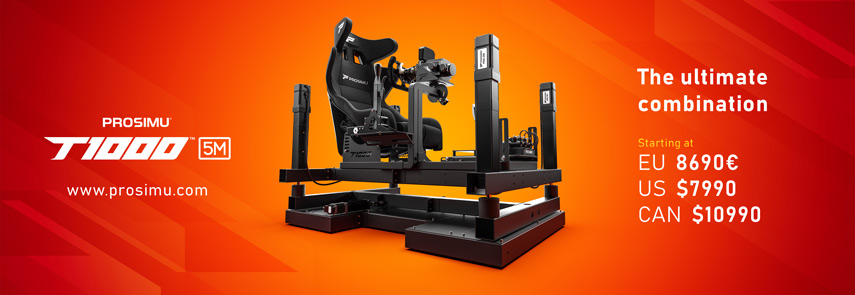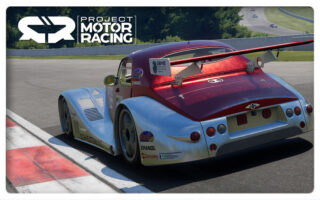FIA To Broaden Its Sim Racing Scope
I remember mentioning racing games/racing simulators at a real-world racing track or event, would ridicule you in an instant. Blurring the lines between real and virtual motorsport was not a popular topic back then. Those days have now gone, due to the fact that eSports has become big business and sim racing, although late to the ESports game, is starting to take its share of the available revenue. And let’s be honest. If there is one thing that sparks the interest of the FIA, it must be money.
It all started back in 2014 when Polyphony Digital and the Fédération Internationale de l’Automobile (FIA) announced that Gran Turismo 6 would become the first-ever racing game to feature FIA-certified content. Now 5 years later, in a recent article, the FIA outlined their current view on competitive virtual racing.
Quote
Esports is one of the fastest-growing industries in the world, with studies claiming it will surpass $1 billion in revenue through 2019 with an audience of 454 million. And motor sport has not escaped its reach, with the FIA at the forefront of the digital racing revolution
While racing video games have been available for a long as there have been screens on which to play them, it is only in the last five years that digital motor sport has truly taken off in motor sport. As games become more realistic and far closer to simulations, the lines between the real and virtual worlds of racing continue to be blurred, powered by the formation of a number of high-profile championships.
After early steps were made to take gamers from their sofas to the race track by Nissan’s GT Academy more than a decade ago, sim racers now have a increasingly wide-ranging and ever-more sophisticated number of races series available in which to compete. Formula One formed its own Esports Series in 2017, with its third season enjoying the participation of all 10 teams involved the FIA’s top single-seater category and featuring a prize pool of $500,000; McLaren has established its own in-house digital racing programme, McLaren Shadow Project, to help uncover new talent that can support its simulator team; and as the global regulator of motor sport, the FIA has also embraced Esports as a increasingly valid motor sport activity through its FIA Certified Gran Turismo Sport Championships, launched in 2018. Interest in these championships has been significant. Over half a million racers entered McLaren’s Shadow Project in 2018. More than 66,000 gamers took part in the F1 Esports Series, which attracted a global audience of five million. And over 80 per cent of the series’ viewers were aged under 35, proving the appeal of digital motor sport – especially to younger generations.
CLEAR CROSSOVER
For FIA Deputy President for Sport Graham Stoker, the close crossover between motor sport and digital racing has given the Federation a unique opportunity to further its involvement and help its development. “The simulated games involving driving and motor sport are now so accurate that it starts to have a serious implication for us,” says Stoker.
“The skills, unusually, are directly transferable. That’s not the case obviously with many of the other digital racing series. You think about the football game. The people who win it haven’t got the skills to go on a pitch and kick a ball around. But with motor sport, it’s really quite unusual: there is a very real crossover. And the FIA is uniquely placed to use this as a way of encouraging people into motor sport.” The FIA Certified Gran Turismo Sport Championships utilises the hugely popular Gran Turismo Sport game on PlayStation 4, and through the platform racers from all over the world are able to take part online and attempt to qualify for a series of live events, where they compete individually for the Nations Cup and in teams for the Manufacturers Series.
FIA Secretary General for Sport Peter Bayer – a gamer himself – feels the partnership with Gran Turismo has been a game-changer for the Federation, allowing it to not only widen participation in motor sport but also help discover new talent that may otherwise not get the opportunity on track in real life.
“When the Gran Turismo people approached the FIA and presented the idea of creating an FIA sports league within the game, I think that was a genuinely exciting piece of news for us,” says Bayer. “We’ve been trying for a while to understand how we could engage within that whole side of digital motor sports and this was a wonderful access point.
“For us, it’s a huge opportunity to grow the sport, to find new talent, and all of it in a safe and quite cost-efficient environment. Once you have your console, a driving seat and other accessories at home, the cost for the game is not really high.”
The cost-efficient nature of digital motor sport has been particularly effective in countries without a long-standing racing culture that are looking for ways to grow motor sport.
“It’s opening new markets to us,” explains Bayer. “We’ve had huge interest from countries where motor sport is not as developed as it might be in European, North American or Asian countries. And for those people, it offers a real opportunity to engage with a young audience, to get new potential drivers on board.
“There are famous examples of kids driving on simulators and coming up through the gaming world, and then you put them into a real car and, after a couple of days, they start winning races. It’s a tremendous opportunity.”
Two racers making the transition from the virtual to the real world are Igor Fraga and Brendon Leigh. Fraga was crowned the first FIA Gran Turismo Nations Cup champion in Monaco last year and won the McLaren Shadow Project competition to become part of its F1 set-up, while Leigh is a two-time F1 Esports Series champion and part of Mercedes’ Esports team.
After seeing his on-track motor sport career stall due to funding struggles – a challenge faced by many young drivers – Fraga saw digital motor sport as a way to further his career.
“I realised that this actually could give me a chance to step up my real-life racing career,” the Brazilian says, with his success in 2018 allowing him to secure a drive in the Formula European Regional Championship this season, where he has scored two podiums from five races. Leigh, a former kitchen porter, has become the face of F1 Esports with back-to-back title wins, leading to his entry in the Race of Champions and the Formula Ford 1600 Series in the UK in 2019. “It’s proving that things are getting more accurate and it’s becoming a transfer window for simulator drivers going to the real world,” says Leigh. “If you don’t have the budget to go karting, maybe you work your way up the ranks and do F1 Esports, and build your baseline race craft and knowledge of driving the car. Then you can go and test a car and see if you’ve got it in the real world as well.”
DIGITAL DRIVE
As well as giving sim racers the chance to move into real-world racing, digital motor sport is also becoming a motor sport activity in its own right, offering some thrilling action that has captured the interest of viewers across the globe.
“Any racing enthusiast can tune in to an Esports race and follow what’s going on,” says Julian Tan, Head of Esports and Growth at Formula One. “All our cars are equalised, which creates closer racing. Our races are 25 per cent of the normal race, so they’re quick with lots of action. And the drivers themselves are more willing to take risks, which creates an exciting Esports product from a viewer’s perspective.”
The FIA is eager to further digital motor sport as a parallel activity to its on-track championships and a Digital Motorsport Working Group has been formed to explore its interests in the discipline. Digital motor sport will also be one of the disciplines contested at the inaugural FIA Motorsport Games in Rome later this year, alongside GT racing, touring cars, Formula 4, drifting and karting.
“When we had the opportunity to select the disciplines that would go into the Motorsport Games, it quickly became clear we needed to include digital motor sport in the line-up, as it demonstrates our commitment and our conviction to this big opportunity for motor sport,” explains Bayer.
“Our ASNs have been asking us for support in this area. There is huge interest among our Member Clubs and it was probably a logical step really to say that we have established the FIA Certified Gran Turismo Sport Championships to put it next to our traditional racing disciplines.” Germany’s ADAC (Allgemeine Deutsche Automobil-Club e V) is Europe’s biggest automobile club and has seen how digital motor sport can help bring through a new generation of fans, as well as giving huge numbers of people the chance to race competitively via the virtual championships it has been setting up.
“We brought the old motor sport world and the clubs in the villages into the digital world through sim racing,” says ADAC’s Marc Hennerici. “We have approximately 6,000 clubs in Germany and all of these clubs are starting to compete against each other in high-end simulators.
“This has been a real success,” he adds. “The clubs are telling me they are gaining lots of new members, and all those new members are between 14 and 23 years old. This is something they have not experienced since the days of Michael Schumacher’s success in the 1990s, having new and young members.”
For FIA Deputy President Stoker, it is this kind of accessibility that makes digital motor sport so important for the FIA in the future. “Anything that gives a richer experience to the fans and encourages people to get involved in racing in some way or another is a great thing,” he says. “When I go to events such as FIA Girls on Track or Dare to be Different, you see eight-year-olds through to 18-year-olds queuing up to have a go on these simulators.
“No matter where in motor sport they end up in the future, as long as they do stay in motor sport, I’m happy,” he concludes. “They may be engineers, they might be volunteers, they might be drivers or they might be working in teams, but whatever their ultimate destination, the idea of getting exciting, hands-on experience through a simulator that fires your imagination is a great thing. It’s a genuinely exciting prospect.”
Getting connected to the virtual grid
Digital motor sport has become a vehicle for the FIA to help grow motor sport in countries lacking a developed racing culture, with a number of grants being issued under the Motor Sport Development programme
Over the past two years the FIA’s Motor Sport Development programme has helped fund projects in Rwanda, South Africa, Bangladesh and Sri Lanka that are helping to grow participation in motor sport through digital racing. The Rwandan Automobile Club has worked with schools to establish a Gran Turismo Online championship, encouraging participation and trying to convert racers from virtual driving to gaining real-life licences.
A similar scheme has been launched by the MSA in South Africa, which is looking to not only draw new participants to motor sport but identify new talent at a grassroots level. The project aims to attract 200 participants at each of the 12 locations and issue 50 digital licences in its first year. In Bangladesh, a talent search programme has been launched to bring more young people into racing and help develop motor sport in the country, not only through driving but also officiating and engineering. Events are taking place across the country, leading to a finale in the capital, Dhaka.
Finally, Sri Lanka’s Ceylon Motor Sports Club was awarded a grant for Playseats, allowing it to develop an online championship in schools using the rigs. An inter-school final will take place at the end of the programme with the goal of transitioning the winners into real motor sport.
“There are parts of the world where there is huge latent talent,” says FIA Deputy President for Sport Graham Stoker. “Think of Africa, of all the talent there – but we’ve got big issues about getting people into racing. Are there circuits? Are there vehicles available?
“If we were in a position where we could get people into these modern advanced simulators, then we could get involved in some very exciting talent detection around the world.”
Original article – www.fia.com/news/auto-changing-game
Official Webpages – www.fia.com |
 Bsimracing Sim Racing Resources and News for the racing enthousiast.
Bsimracing Sim Racing Resources and News for the racing enthousiast.







